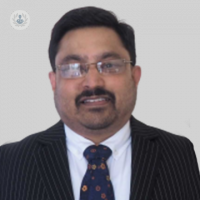Painful shoulder: prevention, causes and treatment
Written by:Many people will have a painful shoulder at least once in their lives and its causes can range from arthritis to accidents. As we get older, the probability of having a painful shoulder may be higher.

Luckily, treatment options to soothe symptoms and often solve conditions causing a painful shoulder are available. We spoke about treatment recently with leading consultant orthopaedic surgeon, Mr Sathya Murthy. He let us know what symptoms such as clicking means and how shoulder pain can be prevented.
What are the main causes of a painful shoulder?
Some of the main causes of a painful shoulder include:
- Impingement (rubbing of a tendon on bone)
- Tears in the rotator cuff tendon
- Arthritis in the shoulder joint and between the collar bone and shoulder blade (AC joint)
- Frozen shoulder
- Unstable shoulder
- Pain referred from the neck, chest or abdomen
How can shoulder pain be prevented?
A lot of causes of shoulder pain cannot be prevented. However, sometimes it can be prevented by:
- Maintaining balance and strength of the rotator cuff muscles
- Good posture
- Avoiding excessive overhead activity
What does a painful shoulder and clicking mean?
It depends on one’s age and activity. For a young person, it may, for example, be overuse at the gym causing tendonitis or bursitis. AC joint problems may be seen in keen gym attendees who enjoy shoulder and bench presses with very heavy weights.
In a middle-aged person, it may be rubbing of the rotator cuff tendons on the acromion bone with or without a tear in the rotator cuff. In the older person, it might be arthritis in the shoulder joint or pain referred from elsewhere in the body.
What are some of the treatment options for a painful shoulder?
It would depend on the cause. A diagnosis needs to be made first of all by clinical assessment and investigations. Physiotherapy should be tried first of all, possibly with activity modification and anti-inflammatory medication.
Steroid injections are often very useful in the diagnosis and treatment. Surgery is the last resort, but is usually very successful in treating shoulder pain. This can be keyhole or open surgery, depending on the condition.
When should I seek advice from a medical specialist for shoulder pain?
If the pain is severe, especially at night, you should seek medical attention straight away. If you have associated fever or weight loss you should also seek urgent medical attention. In other circumstances, try resting the shoulder and taking anti-inflammatories for a week before seeking medical attention as it may settle on its own.
What are some of the surgical options for shoulder pain?
The main surgical options include:
- Manipulation of the shoulder under anaesthetic for a frozen shoulder.
- Keyhole or open surgery, depending on the condition.
Keyhole surgery can be very effective in patients who have had symptoms for more than 6 months, that have not responded to physiotherapy, rest and anti-inflammatory medication. This includes decompression for impingement of the rotator cuff tendons, ACJ excision for arthritis of the AC joint, repair of the rotator cuff tendons, releasing frozen shoulder and stabilisation of the unstable shoulder. Open surgery is indicated for arthritis of the shoulder joint, severe rotator cuff tears and complex instability.
If you’re suffering from shoulder pain, you may like to speak to a leading orthopaedic surgeon such as Mr Murthy. Visit his Top Doctors profile today for more information.


